Unit 3 How do you get to school?单元考点精讲课件(44张PPT)
文档属性
| 名称 | Unit 3 How do you get to school?单元考点精讲课件(44张PPT) | 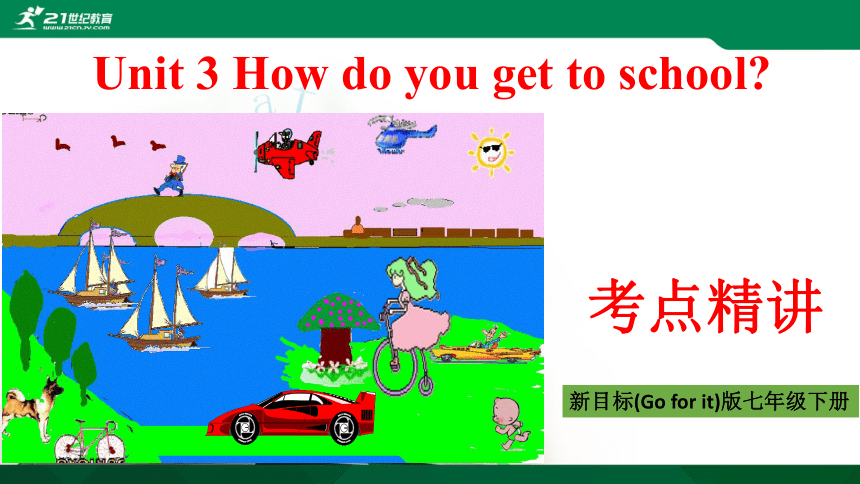 | |
| 格式 | ppt | ||
| 文件大小 | 8.7MB | ||
| 资源类型 | 试卷 | ||
| 版本资源 | 人教新目标(Go for it)版 | ||
| 科目 | 英语 | ||
| 更新时间 | 2023-01-29 21:17:09 | ||
图片预览

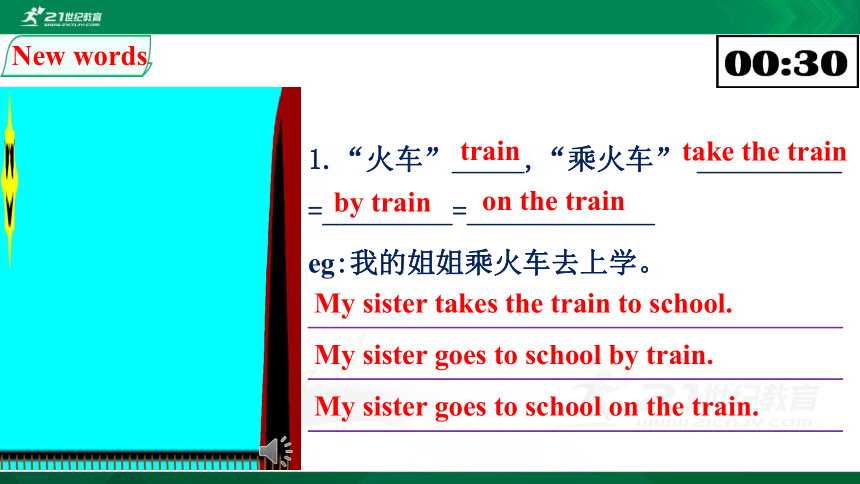
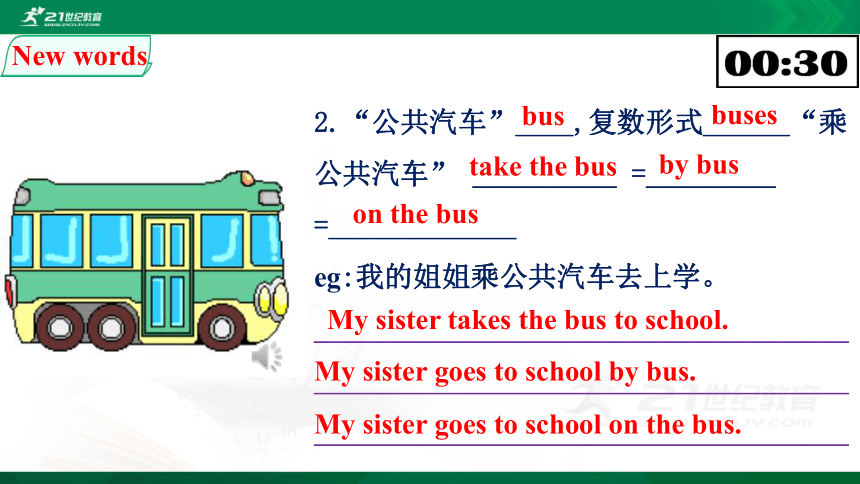
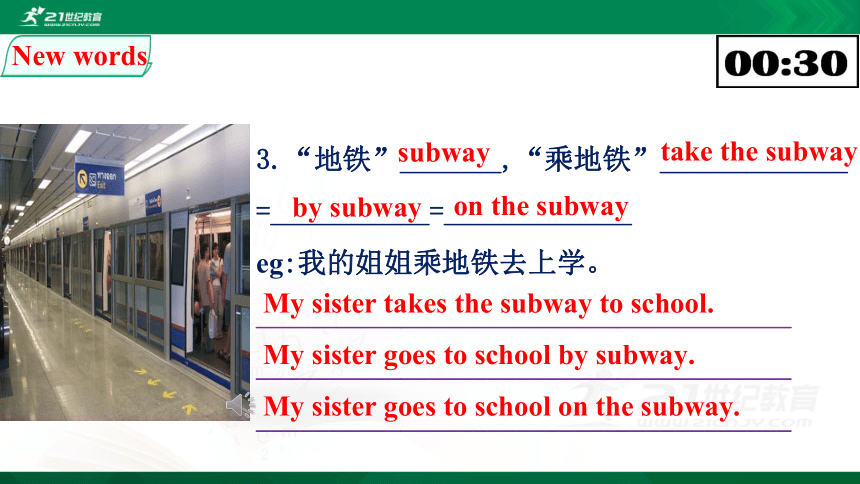
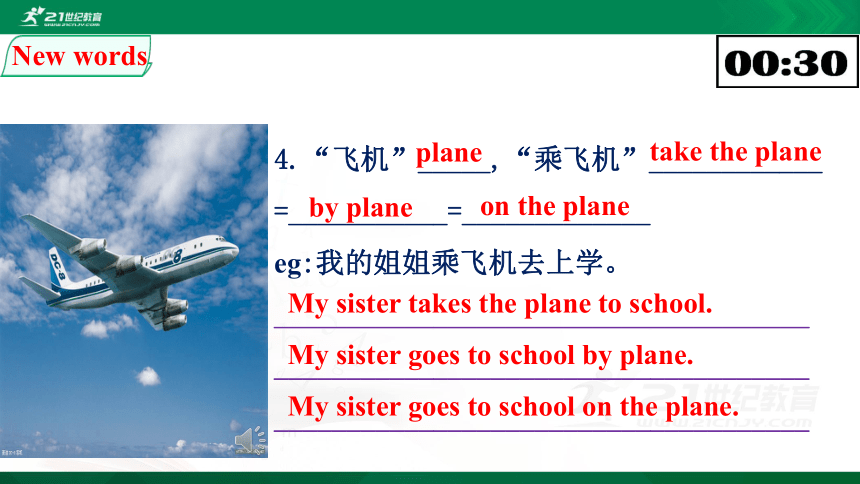
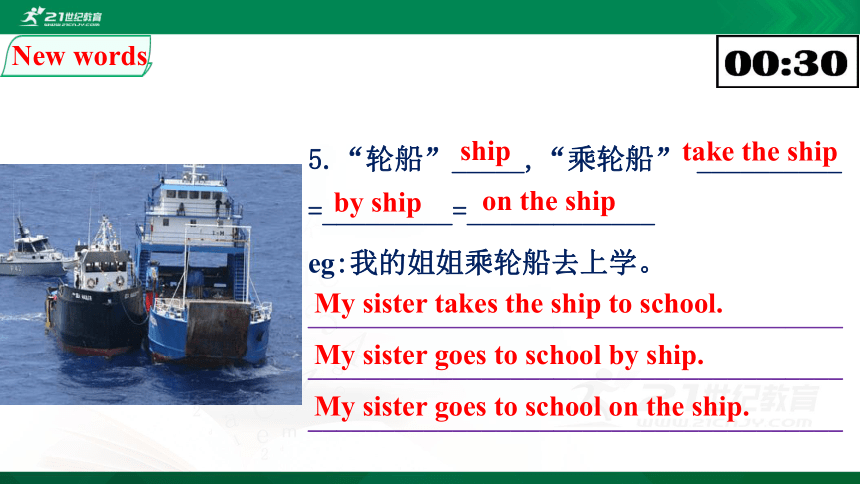
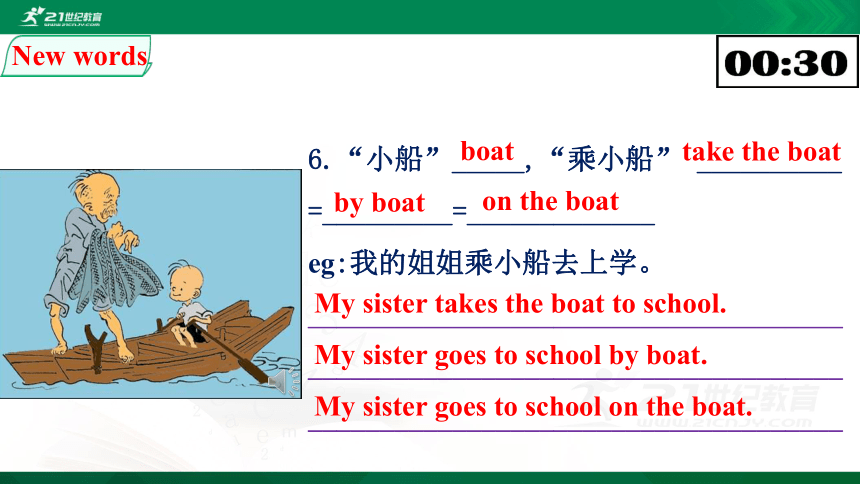
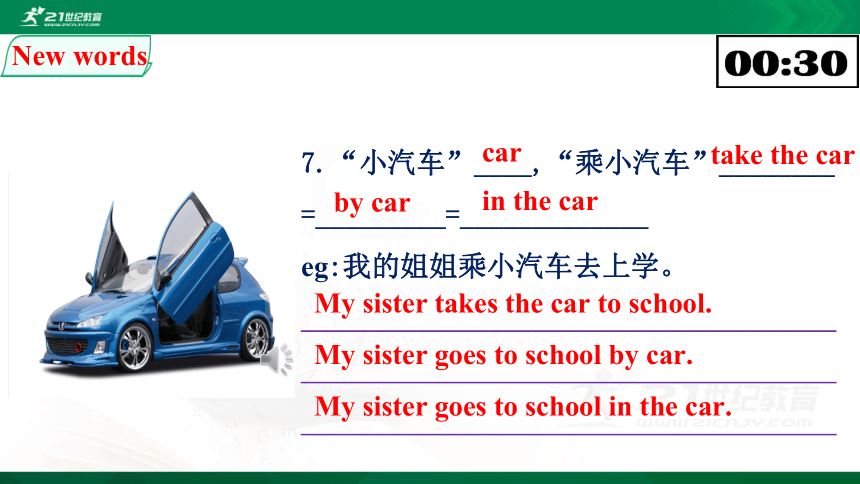
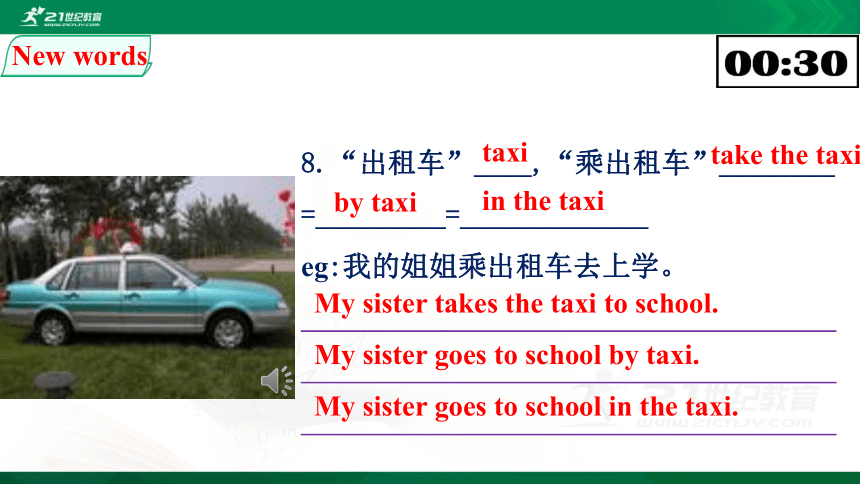
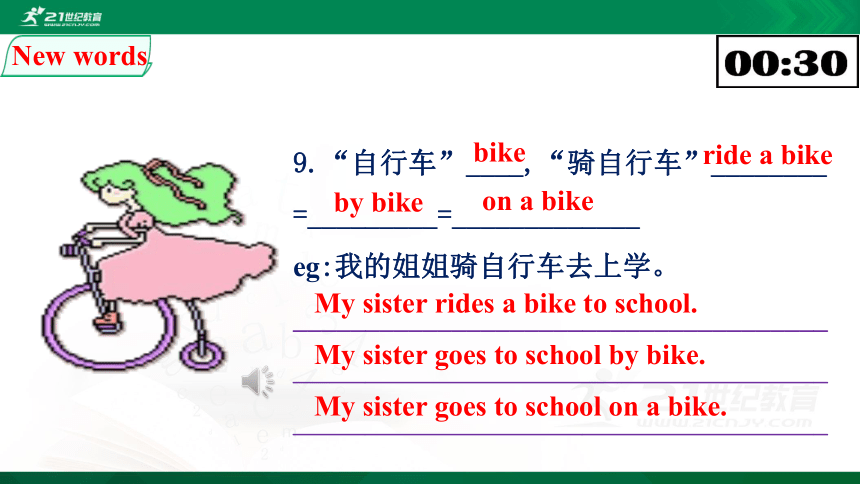
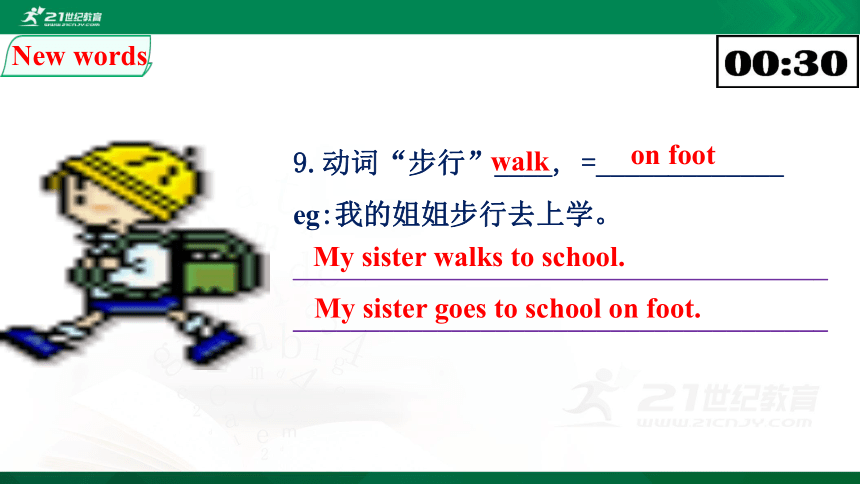
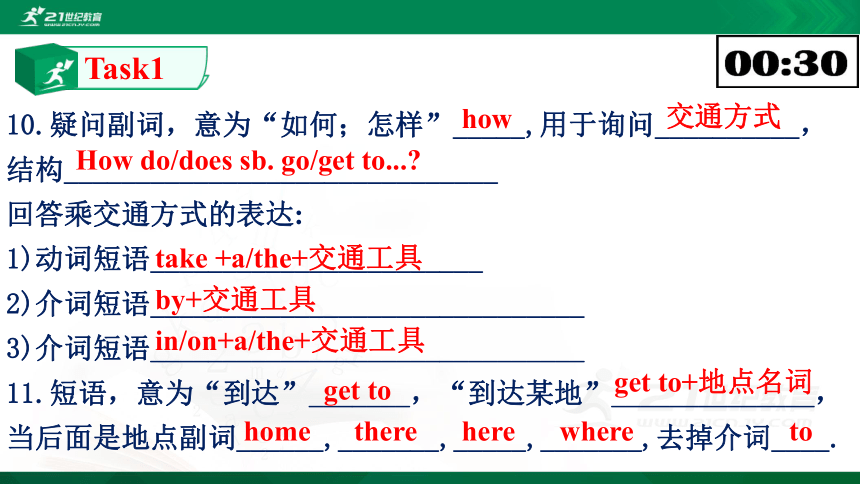
文档简介
(共44张PPT)
Unit 3 How do you get to school
考点精讲
新目标(Go for it)版七年级下册
1.“火车”_____,“乘火车” __________ =_________=_____________
eg:我的姐姐乘火车去上学。_____________________________________
_____________________________________
_____________________________________
train
take the train
on the train
New words
My sister takes the train to school.
by train
My sister goes to school by train.
My sister goes to school on the train.
2.“公共汽车”____,复数形式______“乘公共汽车” __________ =_________ =_____________
eg:我的姐姐乘公共汽车去上学。_____________________________________
_____________________________________
_____________________________________
bus
take the bus
on the bus
New words
My sister takes the bus to school.
by bus
My sister goes to school by bus.
My sister goes to school on the bus.
buses
3.“地铁”_______,“乘地铁”_____________ =___________=_____________
eg:我的姐姐乘地铁去上学。_____________________________________
_____________________________________
_____________________________________
subway
take the subway
on the subway
New words
My sister takes the subway to school.
by subway
My sister goes to school by subway.
My sister goes to school on the subway.
4.“飞机”_____,“乘飞机”____________ =___________=_____________
eg:我的姐姐乘飞机去上学。_____________________________________
_____________________________________
_____________________________________
plane
take the plane
on the plane
New words
My sister takes the plane to school.
by plane
My sister goes to school by plane.
My sister goes to school on the plane.
5.“轮船”_____,“乘轮船” __________ =_________=_____________
eg:我的姐姐乘轮船去上学。_____________________________________
_____________________________________
_____________________________________
ship
take the ship
on the ship
New words
My sister takes the ship to school.
by ship
My sister goes to school by ship.
My sister goes to school on the ship.
6.“小船”_____,“乘小船” __________ =_________=_____________
eg:我的姐姐乘小船去上学。_____________________________________
_____________________________________
_____________________________________
boat
take the boat
on the boat
New words
My sister takes the boat to school.
by boat
My sister goes to school by boat.
My sister goes to school on the boat.
7.“小汽车”____,“乘小汽车”________ =_________=_____________
eg:我的姐姐乘小汽车去上学。_____________________________________
_____________________________________
_____________________________________
car
take the car
in the car
New words
My sister takes the car to school.
by car
My sister goes to school by car.
My sister goes to school in the car.
8.“出租车”____,“乘出租车”________ =_________=_____________
eg:我的姐姐乘出租车去上学。_____________________________________
_____________________________________
_____________________________________
taxi
take the taxi
in the taxi
New words
My sister takes the taxi to school.
by taxi
My sister goes to school by taxi.
My sister goes to school in the taxi.
9.“自行车”____,“骑自行车”________ =_________=_____________
eg:我的姐姐骑自行车去上学。_____________________________________
_____________________________________
_____________________________________
bike
ride a bike
on a bike
New words
My sister rides a bike to school.
by bike
My sister goes to school by bike.
My sister goes to school on a bike.
9.动词“步行”____, =_____________
eg:我的姐姐步行去上学。_____________________________________
_____________________________________
walk
on foot
New words
My sister walks to school.
My sister goes to school on foot.
10.疑问副词,意为“如何;怎样”_____,用于询问__________,
结构______________________________
回答乘交通方式的表达:
1)动词短语_______________________
2)介词短语______________________________
3)介词短语______________________________
11.短语,意为“到达”_______,“到达某地”______________,当后面是地点副词______,_______,_____,_______,去掉介词____.
Task1
take +a/the+交通工具
by+交通工具
in/on+a/the+交通工具
how
交通方式
How do/does sb. go/get to...
get to
get to+地点名词
home
there
here
where
to
1.动词“骑”___,现在分词______,“骑某人的自行”__________ “骑车去某地”______________.
eg:我们骑车去上学。_____________________________________
_____________________________________
2)还可作名词,意为_________,指乘车、骑车的短途旅程.
类似的还有:“步程”_______;“车程”_______
eg:3小时的骑程_______________30分钟的步程_________________
ride
riding
ride to+地点名词
Review
We ride our bikes to school.
ride one's bike(s)
We ride to school.
“旅程”
three hours'ride
walk
drive
thirty minutes'walk
2.基数词“一百”_________,“几百”用___________________,表示“几百几十几”,应在百位和十位或个位之间加_____.
eg:在我们学校大约有九百个学生。
________________________________________________
2)短语“数百的;成百上千的”_____________
eg:数百名运动员参加这次比赛。
_____________________________________
3)类似用法的单词还有:“千”_________,“百万”_________,
“十亿”_________.
4)具体数目两无__________;模糊数目两有__________。
hundred
“ 基数词+hundred”
There are about nine hundred students in our school.
New words
hundreds of
and
Hundreds of players take part in the game.
thousand
million
billion
(无s 无of)
(有s 有of)
3.形容词“每一:每个”______,后接_____________.
1)“每天” _________,在句中作状语.
eg:每天我骑自行车上学。__________________________________
1)形容词“日常的” _________,用在名词前作定语.
eg:每天我学习日常英语。__________________________________
4.可数名词“千米”_________,类似的长度单位:“米”_______
“英里”______.eg:4千米________________
every
every day
everyday
New words
I study everyday English every day.
Every day I ride my bike to school.
可数名词单数
kilometer
meter
mile
four kilometers
5.用来询问距离或路程的远近________,意为_______.常用句型:“从A到B有多远 ”______________________或___________________
eg:从你家到学校有多远 _____________________________________
=___________________________________常见回答:
1)用长度单位表示_____________________________
eg:4千米。_____________________________________
2)用时间表示____________________________________
eg:30分钟的步程。_____________________________________
2)____________________________________
eg:乘公共汽车5分钟。_____________________________________
how far
“多远”
How far is B from A
New words
How far is it from your home to your school
How far is it from A to B
How far is your school from your home
It's+路程.
It's four kilometers.
It's+基数词+minutes'/hours'+walk/ride/driver.
It's thirty minutes' walk.
It's+时间+by+交通工具.
It's five minutes by bus.
6.句型“做某事花费某人一些时间”_________________________.
其中it为形式主语, 真正的主语是后面的_____________短语。
eg:每天骑自行车上学花费我半个小时。
______________________________________________________
It takes sb. some time to do sth.
It takes me half an hour to go to school by bike every day.
New words
动词不定式
5.用来询问时间的长短__________,意为_____________.常用句型:“做某事花费某人多长时间?”_______________________________
eg:步行上学花费他多长时间
_____________________________________
花费他5分钟。______________________________________
2)还可询问物体的长度,意为________.
eg:这条河有多长?_____________________________________
大约三千米。_______________________________
how long
“多长时间”
How long does it take him to walk to school
New words
How long does it take sb to do sth
“多长”
How long is the river
It takes him five minutes to walk to school.
It's about 3 kilometers.
1.动词“开车”______,现在分词________,名词形式_______ ,“开车去某地”__________________________
eg:我的爸爸开车去上班。_________________________________
“开车去送某人去某地”__________________________
eg:我的爸爸开车送我去上学。_______________________________
drive
driving
drive (one's car )to+地点名词
My father drives (his car) to work.
driver
My father drives me to school.
drive sb. to+地点名词
New words
2.“居住”_____,“居住在多远的地方”______________________
eg:我住在距离学校3千米的地方。 ___________________________
2)“居住的离...遥远”______________________
eg:我住的距离学校很远。 ___________________________
3)“离...遥远”______________________
eg:我家离学校很远。 ___________________________
3.“做某事需要一段时间”_______________________
eg:我需要30分钟到达学校。 ___________________________
live
I live 3 kilometers from my school.
New words
live+距离+from+地点名词
live far from...
I live far from my school.
be far from...
My home is far from my school.
need some time to do sth
I need thirty minutes to get to school.
4.“乘(交通工具)”动词______,“乘交通工具去某地” _______________________________,但骑车和开车用_____和_____
步行_______乘飞机 _______
eg:我乘公交车去那里。_________________________________
2)“乘(交通工具)”介词_____,“乘交通工具去某地” __________________________,牢记后接的交通工具前不用_____,
还要用名词__________.拓展:“乘船”__________“乘飞机”____
eg:我乘公交车去那里。_________________________________
3)还可用介词______,结构___________________________________
eg:我乘公交车去那里。_________________________________
take
take+冠词+交通工具+to+地点名词
Review
I take the bus there.
ride
drive
by
go to +地点名词+by+交通工具
冠词
单数形式
by sea/water
by air
in/on
I go there by bus.
go to +地点名词+on/in+限定词+交通工具
I go there on the bus.
walk
fly
how
如何;怎样
疑问词 意思 询问对象 答语
疑问副词
交通方式
take(s)/drive(s)/ride(s)+冠词+交通工具+to+地点名词
go(es) to +地点名词+by+交通工具
go(es) to +地点名词+on/in+限定词+交通工具
walk(s)/drive(s)/ride(s)/fly(flies)+to+地点名词
Summary
how long
多长时间
疑问词 意思 询问对象 答语
疑问词组
多长
时间长短
物体长度
It takes sb. some time to do sth.
It's about+时间段.
Summary
It's about+长度.
how far
多远
距离
It's+路程+from A to B.
B+is+路程+from A .
It's+基数词+minutes'/hours'+walk/ride/drive.
It's+时间+by+交通工具.
价格
“多少钱”
不可数名词
“多少”
可数名词
可数名词
多少
How much are these shoes
易混词 用法 例句
how much 询问_____,意为____________ 这些袜子多少钱
______________________
用于提问___________的数量
,后接___________意为_______ 你想要多少牛奶
______________________
how many 用于提问___________的数量
,后接___________意为_______ 你有多少本书
______________________
8. how much与how many的辨析:
How much milk do you want?
How many books do you have
不可数名词
Summary
疑问词 含义 询问对象 例句
疑问词组 你的妹妹多大了
你多久弹一次吉他
你将多久以后回来?
how often
多久以后
动作频率
How often do you play the guitar
how soon
多少一次
将来的时间
How soon will you come back
how old
多大年纪
年龄
How old is your sister
Summary
1.名词“车站点”_____,“车站”________,“在公交站点” ______________
2)还可作动词________,常用结构:
“停下来去另外一件事”_________________
eg:我想停下来休息一下。_______________________________
“停止做某事”(停止正在做的事)_________________
eg:请停止说话!_______________________________
stop
station
“停止”
stop to do sth.
at the bus stop
stop doing sth.
I want to stop to have a rest.
New words
Stop talking,please.
不及物动词
arrive in Beijing
Review
reach Beijing
get to Beijing
to
in
at
arrive at school
辨析get to, arrive 与reach
词语 词性 用法 例子
get get_____+地点名词 到达北京
_____+地点副词 到家
arrive arrive_____+小地方 到达学校
arrive_____+大地方 到达北京
_____+地点副词 到家
reach _____+地点名词 到达北京
get
get home
不及物动词
arrive
arrive home
及物动词
reach
2.短语“认为”________,同义词____________,用于征询别人的看法或意见 ______________________,相当于__________________.意为___________________.
eg:你认为这个故事怎么样? ___________________________
___________________________
2)还意为________
eg:那个女孩经常想起她的父母. ___________________________
3)思考,考虑___________ 仔细考虑___________
think of
What do you think of...
New words
think about
How do you like...
你认为...怎么样?
What do you think of the story
How do you like the story
“想起”
The girl often thinks of her parents.
think about
think over
3.Mary wants to know what he thinks of the trip. 玛丽想知道他认为这次旅行怎么样。
这是一个在含有what引导的__________的主从复合句,主句的主语是______,谓语是______________,宾语是一个特殊疑问句,原句应为_____________________________,但在复合句中,宾语从句要用_______语序.其中______位置不变,仍放在宾语从句的______.当主句是一般现在时,从句的时态根据情况选择.
eg:我知道他住在哪儿。 ___________________________
宾语从句
wants to know
New words
Mary
“what does he think of the trip ”
陈述句
疑问词
句首
I know where he lives.
①Crossing the River to School 过河去上学
动词
横过
cross the road
介词
go across
go across
横过
New words
go across the street
词语 词性 意思 用法 例子
cross 同义词__________ 过马路______________
across 搭配__________ 穿过街道_____________
crossing 在十字路口___________
1.辨析cross, across 与crossing
名词
at the crossing
十字路口
②For many students, it is easy to get to school.对许多学生来说,到校是容易的。
2.“(对某人来说)做某事是…的.”_________________________
其中It 为_________,后面的__________是句子真正的主语。形容词是描述_____特征的词,如“重要的”__________“困难的”______
eg:对我们来说,学好英语是重要的。
______________________________________
It is+adj.+(for sb.)+to do sth.
to do sth.
New words
形式主语
事物
important
difficult
It is important for us to learn English well.
3.“某人做某事是…的.”___________________________
形容词是描述____的性格;品质的词,如“聪明的”_______“和蔼的”______;“好的”______
eg:你帮我做作业真是太好了。
______________________________________________
It is+adj.+of sb.+to do sth.
clever
New words
人
kind
nice
It’s very nice of you to help me with my homework.
③There is a very big river between their school and the village.
在他们的学校和村子之间有条非常大的河。
4.本句是_________句型,结构为________________________,意为__________________________。There be句型遵循_____________,即be动词取决于离它最近的名词的单复数。
eg: 教室里有一位老师和十名学生。
______________________________________________
there be
“某地或某时有某人或某物”
New words
There be+某人/某物+某地.
“就近原则”
There is a teacher and ten students in the classroom.
介词
在…之间
between me and him
在…之中
between...and...
among us
New words
词语 词性 意思 用法 例子
between 在…和…之间
_____________ 在我和他之间____________________
among 三者或三者以上中 在我们之中___________
5.辨析between 与among
6.可数名词,“村庄”_______,“村民”_______
eg: 小村庄里有许多村民。
______________________________________________
village
villager
There are many villagers in a small village.
④There is no bridge and the river runs too quickly for boats.
(河上)没有桥,河水流得太急,不宜于小船(摆渡)。
7.形容词,“没有”_____,修饰可数名词单数时,相当于________,eg: 没有桥。______________________
2)修饰可数名词复数或不可数名词时,相当于________
eg: 我没有兄弟。________________=________________________
eg: 没有水。________________=________________________
no
There isn't a bridge.
New words
not a/an
I have no brothers.
I don't have any brothers.
not any
There isn't any water.
There is no water.
⑤So these students go on a ropeway to cross the river to school.
因此这些学生乘索道过河去上学。
8.可数名词,“索道”________,“乘索道”_______________,
eg: 他们乘索道去上学。______________________________
9. to cross the river to school是动词不定式短语,在句中作________
eg: 我早起是为了赶上早班车。_______________________________
ropeway
They go on a ropeway to school.
New words
go on a ropeway
目的状语
I get up early to catch the early bus.
⑥One 11-year-old boy, Liangliang, crosses the river every school day.
亮亮,一个11岁男孩,每天过河上学。
10.11-year-old意为_________ ,是复合_______,修饰名词boy。
“11岁的”
复合形容词
New words
形容词
定语
基数词-名词单数-形容词
辨析11-year-old与11 years old
词语 词性 句中成分 结构 例句
11-year-old 她是一个八岁女孩。
11 years old year有单复数,各词之间没有______ 她八岁了。
She is an 8-year-old girl.
She is 8 years old.
短语
表语
连字符
⑦But he is not afraid because he loves school.
但是他不害怕,因为他喜欢上学。
11.形容词,“害怕”_____,在句中作表语.
1)“害怕某物”___________________
eg: Mary害怕蛇。______________________
2)“害怕做某事”___________________
eg: Mary害怕晚上外出.__________________________________
3)“恐怕...”___________________
eg:明天我怕他不能来.__________________________________
afraid
Mary is afraid of snakes.
New words
be afraid of sth.
be afraid to do sth.
Mary was afraid to go out at night.
be afraid+that从句
I’m afraid that he can’t come tomorrow.
⑧ He’s like a father to me. 他就像父亲一样对我。
12.介词,“像”_____,短语“像...”_______,指性格;品质方面像
“看起来像”_______,指外貌上像.
eg: Kate 特像她的妈妈。_________________________
eg: 我和我爸长得像._________________________
2)动词_________
like
look like
New words
be like
Kate is very like her mother.
I look like my father.
“喜欢”
⑨Many of the students and villagers never leave the village.
许多学生和村民从未离开过村庄。
13.及物动词,“离开”_____,也可作不及物动词。
1)“离开A去B”___________________
eg: 我将要离开北京去上海。____________________________
2)“动身去B”___________________
eg: 我将要动身去上海。______________________________
leave
I will leave Beijing for Shanghai.
New words
leave A for B
leave for B
I will leave for Shanghai.
⑩Can their dream come true 他们的梦想能实现吗?
14.不及物动词短语,“实现”__________,主语是“梦想”________
“愿望”_______或目标等,其后不能跟宾语。
eg: 努力学习,你的梦想将会实现。
_________________________________________
15. 形容词,“真的”______,名词形式______,意为_______.
eg: 你能告诉我真相吗?_____________________________
come true
wish
New words
dream
Study hard,and your dream will come true.
true
truth
“真相”
Can you tell me the truth
Thanks for your last e-mail.
16.“因...而感谢你(们)”的句型是_______________,相当于____________,其中for为介词后接_______________________,表示感谢的原因.
eg: 谢谢你的帮助。_____________________________
eg: 谢谢你帮助我。_____________________________
Thank you for...
Thanks for...
名词;代词;动词的-ing
Thanks for your help.
Thanks for helping me.
Review
谢谢
21世纪教育网(www.21cnjy.com) 中小学教育资源网站
有大把高质量资料?一线教师?一线教研员?
欢迎加入21世纪教育网教师合作团队!!月薪过万不是梦!!
详情请看:
https://www.21cnjy.com/help/help_extract.php
Unit 3 How do you get to school
考点精讲
新目标(Go for it)版七年级下册
1.“火车”_____,“乘火车” __________ =_________=_____________
eg:我的姐姐乘火车去上学。_____________________________________
_____________________________________
_____________________________________
train
take the train
on the train
New words
My sister takes the train to school.
by train
My sister goes to school by train.
My sister goes to school on the train.
2.“公共汽车”____,复数形式______“乘公共汽车” __________ =_________ =_____________
eg:我的姐姐乘公共汽车去上学。_____________________________________
_____________________________________
_____________________________________
bus
take the bus
on the bus
New words
My sister takes the bus to school.
by bus
My sister goes to school by bus.
My sister goes to school on the bus.
buses
3.“地铁”_______,“乘地铁”_____________ =___________=_____________
eg:我的姐姐乘地铁去上学。_____________________________________
_____________________________________
_____________________________________
subway
take the subway
on the subway
New words
My sister takes the subway to school.
by subway
My sister goes to school by subway.
My sister goes to school on the subway.
4.“飞机”_____,“乘飞机”____________ =___________=_____________
eg:我的姐姐乘飞机去上学。_____________________________________
_____________________________________
_____________________________________
plane
take the plane
on the plane
New words
My sister takes the plane to school.
by plane
My sister goes to school by plane.
My sister goes to school on the plane.
5.“轮船”_____,“乘轮船” __________ =_________=_____________
eg:我的姐姐乘轮船去上学。_____________________________________
_____________________________________
_____________________________________
ship
take the ship
on the ship
New words
My sister takes the ship to school.
by ship
My sister goes to school by ship.
My sister goes to school on the ship.
6.“小船”_____,“乘小船” __________ =_________=_____________
eg:我的姐姐乘小船去上学。_____________________________________
_____________________________________
_____________________________________
boat
take the boat
on the boat
New words
My sister takes the boat to school.
by boat
My sister goes to school by boat.
My sister goes to school on the boat.
7.“小汽车”____,“乘小汽车”________ =_________=_____________
eg:我的姐姐乘小汽车去上学。_____________________________________
_____________________________________
_____________________________________
car
take the car
in the car
New words
My sister takes the car to school.
by car
My sister goes to school by car.
My sister goes to school in the car.
8.“出租车”____,“乘出租车”________ =_________=_____________
eg:我的姐姐乘出租车去上学。_____________________________________
_____________________________________
_____________________________________
taxi
take the taxi
in the taxi
New words
My sister takes the taxi to school.
by taxi
My sister goes to school by taxi.
My sister goes to school in the taxi.
9.“自行车”____,“骑自行车”________ =_________=_____________
eg:我的姐姐骑自行车去上学。_____________________________________
_____________________________________
_____________________________________
bike
ride a bike
on a bike
New words
My sister rides a bike to school.
by bike
My sister goes to school by bike.
My sister goes to school on a bike.
9.动词“步行”____, =_____________
eg:我的姐姐步行去上学。_____________________________________
_____________________________________
walk
on foot
New words
My sister walks to school.
My sister goes to school on foot.
10.疑问副词,意为“如何;怎样”_____,用于询问__________,
结构______________________________
回答乘交通方式的表达:
1)动词短语_______________________
2)介词短语______________________________
3)介词短语______________________________
11.短语,意为“到达”_______,“到达某地”______________,当后面是地点副词______,_______,_____,_______,去掉介词____.
Task1
take +a/the+交通工具
by+交通工具
in/on+a/the+交通工具
how
交通方式
How do/does sb. go/get to...
get to
get to+地点名词
home
there
here
where
to
1.动词“骑”___,现在分词______,“骑某人的自行”__________ “骑车去某地”______________.
eg:我们骑车去上学。_____________________________________
_____________________________________
2)还可作名词,意为_________,指乘车、骑车的短途旅程.
类似的还有:“步程”_______;“车程”_______
eg:3小时的骑程_______________30分钟的步程_________________
ride
riding
ride to+地点名词
Review
We ride our bikes to school.
ride one's bike(s)
We ride to school.
“旅程”
three hours'ride
walk
drive
thirty minutes'walk
2.基数词“一百”_________,“几百”用___________________,表示“几百几十几”,应在百位和十位或个位之间加_____.
eg:在我们学校大约有九百个学生。
________________________________________________
2)短语“数百的;成百上千的”_____________
eg:数百名运动员参加这次比赛。
_____________________________________
3)类似用法的单词还有:“千”_________,“百万”_________,
“十亿”_________.
4)具体数目两无__________;模糊数目两有__________。
hundred
“ 基数词+hundred”
There are about nine hundred students in our school.
New words
hundreds of
and
Hundreds of players take part in the game.
thousand
million
billion
(无s 无of)
(有s 有of)
3.形容词“每一:每个”______,后接_____________.
1)“每天” _________,在句中作状语.
eg:每天我骑自行车上学。__________________________________
1)形容词“日常的” _________,用在名词前作定语.
eg:每天我学习日常英语。__________________________________
4.可数名词“千米”_________,类似的长度单位:“米”_______
“英里”______.eg:4千米________________
every
every day
everyday
New words
I study everyday English every day.
Every day I ride my bike to school.
可数名词单数
kilometer
meter
mile
four kilometers
5.用来询问距离或路程的远近________,意为_______.常用句型:“从A到B有多远 ”______________________或___________________
eg:从你家到学校有多远 _____________________________________
=___________________________________常见回答:
1)用长度单位表示_____________________________
eg:4千米。_____________________________________
2)用时间表示____________________________________
eg:30分钟的步程。_____________________________________
2)____________________________________
eg:乘公共汽车5分钟。_____________________________________
how far
“多远”
How far is B from A
New words
How far is it from your home to your school
How far is it from A to B
How far is your school from your home
It's+路程.
It's four kilometers.
It's+基数词+minutes'/hours'+walk/ride/driver.
It's thirty minutes' walk.
It's+时间+by+交通工具.
It's five minutes by bus.
6.句型“做某事花费某人一些时间”_________________________.
其中it为形式主语, 真正的主语是后面的_____________短语。
eg:每天骑自行车上学花费我半个小时。
______________________________________________________
It takes sb. some time to do sth.
It takes me half an hour to go to school by bike every day.
New words
动词不定式
5.用来询问时间的长短__________,意为_____________.常用句型:“做某事花费某人多长时间?”_______________________________
eg:步行上学花费他多长时间
_____________________________________
花费他5分钟。______________________________________
2)还可询问物体的长度,意为________.
eg:这条河有多长?_____________________________________
大约三千米。_______________________________
how long
“多长时间”
How long does it take him to walk to school
New words
How long does it take sb to do sth
“多长”
How long is the river
It takes him five minutes to walk to school.
It's about 3 kilometers.
1.动词“开车”______,现在分词________,名词形式_______ ,“开车去某地”__________________________
eg:我的爸爸开车去上班。_________________________________
“开车去送某人去某地”__________________________
eg:我的爸爸开车送我去上学。_______________________________
drive
driving
drive (one's car )to+地点名词
My father drives (his car) to work.
driver
My father drives me to school.
drive sb. to+地点名词
New words
2.“居住”_____,“居住在多远的地方”______________________
eg:我住在距离学校3千米的地方。 ___________________________
2)“居住的离...遥远”______________________
eg:我住的距离学校很远。 ___________________________
3)“离...遥远”______________________
eg:我家离学校很远。 ___________________________
3.“做某事需要一段时间”_______________________
eg:我需要30分钟到达学校。 ___________________________
live
I live 3 kilometers from my school.
New words
live+距离+from+地点名词
live far from...
I live far from my school.
be far from...
My home is far from my school.
need some time to do sth
I need thirty minutes to get to school.
4.“乘(交通工具)”动词______,“乘交通工具去某地” _______________________________,但骑车和开车用_____和_____
步行_______乘飞机 _______
eg:我乘公交车去那里。_________________________________
2)“乘(交通工具)”介词_____,“乘交通工具去某地” __________________________,牢记后接的交通工具前不用_____,
还要用名词__________.拓展:“乘船”__________“乘飞机”____
eg:我乘公交车去那里。_________________________________
3)还可用介词______,结构___________________________________
eg:我乘公交车去那里。_________________________________
take
take+冠词+交通工具+to+地点名词
Review
I take the bus there.
ride
drive
by
go to +地点名词+by+交通工具
冠词
单数形式
by sea/water
by air
in/on
I go there by bus.
go to +地点名词+on/in+限定词+交通工具
I go there on the bus.
walk
fly
how
如何;怎样
疑问词 意思 询问对象 答语
疑问副词
交通方式
take(s)/drive(s)/ride(s)+冠词+交通工具+to+地点名词
go(es) to +地点名词+by+交通工具
go(es) to +地点名词+on/in+限定词+交通工具
walk(s)/drive(s)/ride(s)/fly(flies)+to+地点名词
Summary
how long
多长时间
疑问词 意思 询问对象 答语
疑问词组
多长
时间长短
物体长度
It takes sb. some time to do sth.
It's about+时间段.
Summary
It's about+长度.
how far
多远
距离
It's+路程+from A to B.
B+is+路程+from A .
It's+基数词+minutes'/hours'+walk/ride/drive.
It's+时间+by+交通工具.
价格
“多少钱”
不可数名词
“多少”
可数名词
可数名词
多少
How much are these shoes
易混词 用法 例句
how much 询问_____,意为____________ 这些袜子多少钱
______________________
用于提问___________的数量
,后接___________意为_______ 你想要多少牛奶
______________________
how many 用于提问___________的数量
,后接___________意为_______ 你有多少本书
______________________
8. how much与how many的辨析:
How much milk do you want?
How many books do you have
不可数名词
Summary
疑问词 含义 询问对象 例句
疑问词组 你的妹妹多大了
你多久弹一次吉他
你将多久以后回来?
how often
多久以后
动作频率
How often do you play the guitar
how soon
多少一次
将来的时间
How soon will you come back
how old
多大年纪
年龄
How old is your sister
Summary
1.名词“车站点”_____,“车站”________,“在公交站点” ______________
2)还可作动词________,常用结构:
“停下来去另外一件事”_________________
eg:我想停下来休息一下。_______________________________
“停止做某事”(停止正在做的事)_________________
eg:请停止说话!_______________________________
stop
station
“停止”
stop to do sth.
at the bus stop
stop doing sth.
I want to stop to have a rest.
New words
Stop talking,please.
不及物动词
arrive in Beijing
Review
reach Beijing
get to Beijing
to
in
at
arrive at school
辨析get to, arrive 与reach
词语 词性 用法 例子
get get_____+地点名词 到达北京
_____+地点副词 到家
arrive arrive_____+小地方 到达学校
arrive_____+大地方 到达北京
_____+地点副词 到家
reach _____+地点名词 到达北京
get
get home
不及物动词
arrive
arrive home
及物动词
reach
2.短语“认为”________,同义词____________,用于征询别人的看法或意见 ______________________,相当于__________________.意为___________________.
eg:你认为这个故事怎么样? ___________________________
___________________________
2)还意为________
eg:那个女孩经常想起她的父母. ___________________________
3)思考,考虑___________ 仔细考虑___________
think of
What do you think of...
New words
think about
How do you like...
你认为...怎么样?
What do you think of the story
How do you like the story
“想起”
The girl often thinks of her parents.
think about
think over
3.Mary wants to know what he thinks of the trip. 玛丽想知道他认为这次旅行怎么样。
这是一个在含有what引导的__________的主从复合句,主句的主语是______,谓语是______________,宾语是一个特殊疑问句,原句应为_____________________________,但在复合句中,宾语从句要用_______语序.其中______位置不变,仍放在宾语从句的______.当主句是一般现在时,从句的时态根据情况选择.
eg:我知道他住在哪儿。 ___________________________
宾语从句
wants to know
New words
Mary
“what does he think of the trip ”
陈述句
疑问词
句首
I know where he lives.
①Crossing the River to School 过河去上学
动词
横过
cross the road
介词
go across
go across
横过
New words
go across the street
词语 词性 意思 用法 例子
cross 同义词__________ 过马路______________
across 搭配__________ 穿过街道_____________
crossing 在十字路口___________
1.辨析cross, across 与crossing
名词
at the crossing
十字路口
②For many students, it is easy to get to school.对许多学生来说,到校是容易的。
2.“(对某人来说)做某事是…的.”_________________________
其中It 为_________,后面的__________是句子真正的主语。形容词是描述_____特征的词,如“重要的”__________“困难的”______
eg:对我们来说,学好英语是重要的。
______________________________________
It is+adj.+(for sb.)+to do sth.
to do sth.
New words
形式主语
事物
important
difficult
It is important for us to learn English well.
3.“某人做某事是…的.”___________________________
形容词是描述____的性格;品质的词,如“聪明的”_______“和蔼的”______;“好的”______
eg:你帮我做作业真是太好了。
______________________________________________
It is+adj.+of sb.+to do sth.
clever
New words
人
kind
nice
It’s very nice of you to help me with my homework.
③There is a very big river between their school and the village.
在他们的学校和村子之间有条非常大的河。
4.本句是_________句型,结构为________________________,意为__________________________。There be句型遵循_____________,即be动词取决于离它最近的名词的单复数。
eg: 教室里有一位老师和十名学生。
______________________________________________
there be
“某地或某时有某人或某物”
New words
There be+某人/某物+某地.
“就近原则”
There is a teacher and ten students in the classroom.
介词
在…之间
between me and him
在…之中
between...and...
among us
New words
词语 词性 意思 用法 例子
between 在…和…之间
_____________ 在我和他之间____________________
among 三者或三者以上中 在我们之中___________
5.辨析between 与among
6.可数名词,“村庄”_______,“村民”_______
eg: 小村庄里有许多村民。
______________________________________________
village
villager
There are many villagers in a small village.
④There is no bridge and the river runs too quickly for boats.
(河上)没有桥,河水流得太急,不宜于小船(摆渡)。
7.形容词,“没有”_____,修饰可数名词单数时,相当于________,eg: 没有桥。______________________
2)修饰可数名词复数或不可数名词时,相当于________
eg: 我没有兄弟。________________=________________________
eg: 没有水。________________=________________________
no
There isn't a bridge.
New words
not a/an
I have no brothers.
I don't have any brothers.
not any
There isn't any water.
There is no water.
⑤So these students go on a ropeway to cross the river to school.
因此这些学生乘索道过河去上学。
8.可数名词,“索道”________,“乘索道”_______________,
eg: 他们乘索道去上学。______________________________
9. to cross the river to school是动词不定式短语,在句中作________
eg: 我早起是为了赶上早班车。_______________________________
ropeway
They go on a ropeway to school.
New words
go on a ropeway
目的状语
I get up early to catch the early bus.
⑥One 11-year-old boy, Liangliang, crosses the river every school day.
亮亮,一个11岁男孩,每天过河上学。
10.11-year-old意为_________ ,是复合_______,修饰名词boy。
“11岁的”
复合形容词
New words
形容词
定语
基数词-名词单数-形容词
辨析11-year-old与11 years old
词语 词性 句中成分 结构 例句
11-year-old 她是一个八岁女孩。
11 years old year有单复数,各词之间没有______ 她八岁了。
She is an 8-year-old girl.
She is 8 years old.
短语
表语
连字符
⑦But he is not afraid because he loves school.
但是他不害怕,因为他喜欢上学。
11.形容词,“害怕”_____,在句中作表语.
1)“害怕某物”___________________
eg: Mary害怕蛇。______________________
2)“害怕做某事”___________________
eg: Mary害怕晚上外出.__________________________________
3)“恐怕...”___________________
eg:明天我怕他不能来.__________________________________
afraid
Mary is afraid of snakes.
New words
be afraid of sth.
be afraid to do sth.
Mary was afraid to go out at night.
be afraid+that从句
I’m afraid that he can’t come tomorrow.
⑧ He’s like a father to me. 他就像父亲一样对我。
12.介词,“像”_____,短语“像...”_______,指性格;品质方面像
“看起来像”_______,指外貌上像.
eg: Kate 特像她的妈妈。_________________________
eg: 我和我爸长得像._________________________
2)动词_________
like
look like
New words
be like
Kate is very like her mother.
I look like my father.
“喜欢”
⑨Many of the students and villagers never leave the village.
许多学生和村民从未离开过村庄。
13.及物动词,“离开”_____,也可作不及物动词。
1)“离开A去B”___________________
eg: 我将要离开北京去上海。____________________________
2)“动身去B”___________________
eg: 我将要动身去上海。______________________________
leave
I will leave Beijing for Shanghai.
New words
leave A for B
leave for B
I will leave for Shanghai.
⑩Can their dream come true 他们的梦想能实现吗?
14.不及物动词短语,“实现”__________,主语是“梦想”________
“愿望”_______或目标等,其后不能跟宾语。
eg: 努力学习,你的梦想将会实现。
_________________________________________
15. 形容词,“真的”______,名词形式______,意为_______.
eg: 你能告诉我真相吗?_____________________________
come true
wish
New words
dream
Study hard,and your dream will come true.
true
truth
“真相”
Can you tell me the truth
Thanks for your last e-mail.
16.“因...而感谢你(们)”的句型是_______________,相当于____________,其中for为介词后接_______________________,表示感谢的原因.
eg: 谢谢你的帮助。_____________________________
eg: 谢谢你帮助我。_____________________________
Thank you for...
Thanks for...
名词;代词;动词的-ing
Thanks for your help.
Thanks for helping me.
Review
谢谢
21世纪教育网(www.21cnjy.com) 中小学教育资源网站
有大把高质量资料?一线教师?一线教研员?
欢迎加入21世纪教育网教师合作团队!!月薪过万不是梦!!
详情请看:
https://www.21cnjy.com/help/help_extract.php
同课章节目录
- Unit 1 Can you play the guitar?
- Section A
- Section B
- Unit 2 What time do you go to school?
- Section A
- Section B
- Unit 3 How do you get to school?
- Section A
- Section B
- Unit 4 Don't eat in class.
- Section A
- Section B
- Unit 5 Why do you like pandas?
- Section A
- Section B
- Unit 6 I'm watching TV.
- Section A
- Section B
- Review of Units 1-6
- Unit 7 It's raining!
- Section A
- Section B
- Unit 8 Is there a post office near here?
- Section A
- Section B
- Unit 9 What does he look like?
- Section A
- Section B
- Unit 10 I'd like some noodles.
- Section A
- Section B
- Unit 11 How was your school trip?
- Section A
- Section B
- Unit 12 What did you do last weekend?
- Section A
- Section B
